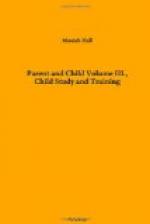QUESTIONS FOR DISCUSSION
1. What are some habits essential to success?
2. When should training to fix these habits begin? Why?
3. Why do many parents fail to fix right habits in their children?
4. How may wrong habits be overcome and right habits established?
5. What does Solomon say in regard to training the child?
6. Give reasons why community habits are so hard to change? What is the good side of this strength of habit?
7. What is the quickest and surest way to bring about desirable social reforms?
MAXIMS ON HABIT
Professor James Gives Four Maxims to Follow in Breaking from an Old Habit or in Acquiring a New One
“1. Take care ’o launch yourself with as strong and decided initiative as possible. Reinforce the right motive with every favorable circumstance; put yourself in a condition that will make the right act easy and the wrong one difficult. Take a public pledge if the case allows; in short, envelop your resolution with every aid possible.
“2. Never suffer an exception to occur until the new habit is securely rooted. Each lapse is like the letting fall of a ball of yarn that is being wound; a single slip undoes more than a great many turns will wind again. It is necessary above all things never to lose a battle; every gain on the wrong side undoes the effects of many conquests on the right.
“3. Seize every opportunity to act in the direction of the desired habit, and permit no emotional prompting in its behalf to escape you. ’Hell is paved with good intentions,’ hence to have good desires, thoughts, intentions without actually working them out weakens and destroys the moral fibre. ‘Character is a completely fashioned will,’ says J.S. Mill, and a will in this sense is an aggregate of tendencies which act in a firm, prompt, and definite way in every emergency of life. When a resolve or a fine glow of feeling is allowed to evaporate without bearing fruit in action, it is worse than a chance lost, it is a positive hindrance to the carrying out of future resolutions. Nothing is more contemptible than a sentimental dreamer who is carried away with lofty thoughts and feeling but who never does a manly, concrete deed. Positive harm is done through cultivating the emotions and sentiments if no outlet is found for some appropriate action.
“4. Keep the faculty of effort alive by a little gratuitous exercise every day. That is, be heroic, do every day something for no other reason than that you would rather not do it, so that when the hour of dire need comes, it may find you nerved and trimmed to stand the test. The man who practices self-denial in unnecessary things will stand like a tower when everything rocks around him and when his softer fellow mortals are winnowed like chaff in a blast.




